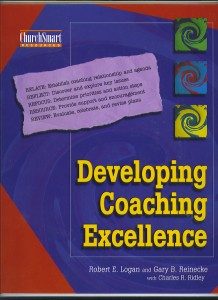 Welcome to a blog series on the 9 competencies of coaching. The primary source for this series is Developing Coaching Excellence and the Developing Coaching Excellence Handbook, which spring from a fairly extensive research process. Today’s introductory entry overviews the process used to arrive at the 9 competences for quality coaching.
Welcome to a blog series on the 9 competencies of coaching. The primary source for this series is Developing Coaching Excellence and the Developing Coaching Excellence Handbook, which spring from a fairly extensive research process. Today’s introductory entry overviews the process used to arrive at the 9 competences for quality coaching.
In early 1999 I was talking with a colleague of mine, Gary Reinecke, about the work we’d been doing training coaches, and we discovered that we had run into a common problem: how could we determine whether the coaches we’d trained were effective or not? Generally we had some idea based on our interactions with them, but we lacked objective norms. How could we objectively measure a coach’s competency? What made an excellent coach excellent? Gary and I both sensed the need for developing a more comprehensive understanding of coaching. Out of that conversation was born a research project that eventually resulted in a comprehensive coaching model and specific norms for measuring coaching effectiveness.
Gary and I formed a team with Dallas Demmitt, Nancy Demmitt, and Jeannette Slater, and began bringing together all we knew about coaching to construct a comprehensive model. We discussed the coaching models we were currently using, along with others that were familiar to us. We tried to dissemble each model, analyze the pieces, and construct a comprehensive understanding of the process, including looking for missing pieces.
Over the next few months, our team pieced together all the essential components of coaching, and the 5 R coaching process emerged: relate, reflect, refocus, resource, and review. That process serves as a road map for coaching relationships. From there, we moved to specific competencies. In order to foster a successful coaching process, what does a coach need to be able to do at each stage of the journey?
We formed a preliminary list of competencies, then requested and incorporated feedback. After that we went to testing, assessing different coaches by asking concrete, behavioral questions. After conducting behavioral interviews with 20 coaches from four continents, we felt we had enough data from a diverse pool of coaches to refine the competencies, microskills, and norms. We did a final field test, soliciting feedback from a variety of places. After strong affirmative feedback, we began looking outward to the works others had put together to see if there were any gaps in our model.
The final product of this research project is the resulting list of nine competencies.
Foundational competencies:
1. Abiding in Christ
2. Self-assessing
3. Communicating
Relational competencies:
4. Establishing
5. Supporting
6. Concluding
Strategic competencies
7. Diagnosing
8. Planning
9. Monitoring
The rest of this blog series will take a look at each of these nine competencies in turn.
